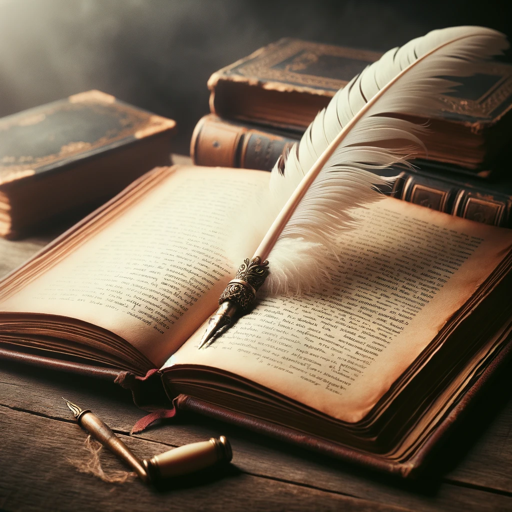How to Read Great Literature-guide to reading classic literature.
AI-powered guide for deeper literary exploration.
Misconceptions about classic literature?
How to interpret literature?
How to read Shakespeare?
Understanding great books?
Related Tools
Load More
Deep Things | Learning with Books, Poetry, Quotes
Deeper dives into reality through reading, quotes, stories, images and anything else you think about. Poem Generator. Deep Thoughts. Book Summaries. Writes narratives, novels, poems, plays and more.

Literature GPT
Guide to world literature, offering analyses, biographies, and themes.

Book Review
Provides detailed and insightful book reviews.

Literature & Literary Expert
Your bespoke literature GPT that specializes in methodic literary analysis in English. Provide PDF (text only) or quotation for desired results.

Read This Book
Upload your book in pdf or word. Ask any questions you have from the book, or even ask me to quiz you.

Book Summary Expert
Prompt the book title and he will summarize it starting by chapter 1, waiting for your prompt for the following chapters…
20.0 / 5 (200 votes)
Introduction to 'How to Read Great Literature'
The 'How to Read Great Literature' service is designed to guide readers through the exploration and deeper understanding of classic works of literature. Its primary function is to offer personalized reading advice, thematic analysis, and historical context, enhancing one's appreciation for canonical texts. By asking users about their reading preferences, experiences, and goals, it provides tailored suggestions for reading classic works, whether those be novels, plays, poetry, or essays. For example, a reader interested in existential themes might be directed to explore Kafka’s 'The Trial' or Camus’ 'The Stranger' with guidance on the philosophical underpinnings of absurdism. This service aims to unlock deeper layers of meaning in literary texts, fostering a richer and more immersive reading experience.

Main Functions of 'How to Read Great Literature'
Personalized Reading Guidance
Example
A reader who enjoys psychological novels might be directed to Tolstoy’s 'Anna Karenina' with an explanation of how Tolstoy explores inner moral conflicts through complex characters.
Scenario
Someone new to 19th-century literature, unsure of where to start, might be guided through a list of accessible yet profound works like 'Great Expectations' by Dickens or 'Madame Bovary' by Flaubert, tailored to their interest in character-driven narratives.
Historical and Contextual Insights
Example
While reading Shakespeare’s 'Hamlet', users might receive guidance on the Elizabethan worldview, the significance of monarchy, and Renaissance humanism to better appreciate the existential dilemmas within the play.
Scenario
A student struggling with Shakespearean language can use the service to understand the political and cultural backdrop of 'Macbeth,' thus unlocking the deeper themes of ambition and fate beyond the plot.
Thematic and Critical Analysis
Example
If a reader is interested in understanding social satire, the service can help deconstruct Swift’s 'Gulliver’s Travels' and explain how it critiques human folly through allegory.
Scenario
A literature club wanting to discuss deeper moral and political themes in Orwell’s '1984' would use the service for focused discussions on surveillance, freedom, and authority, expanding their understanding of its relevance today.
Ideal Users of 'How to Read Great Literature'
Students and Academics
Students and educators studying classic literature will find this service valuable for its ability to break down complex texts into understandable themes, provide historical context, and suggest critical readings that align with academic curricula. It encourages a deeper engagement with texts, perfect for essays or discussions.
General Readers and Book Clubs
Casual readers and book clubs looking to broaden their understanding of literature would benefit from this service’s ability to offer personal guidance based on their interests. Whether exploring timeless classics or understanding intricate narratives, this service offers pathways for non-academic readers to engage with literature meaningfully.

Guidelines for Using How to Read Great Literature
Visit aichatonline.org for a free trial without login, no need for ChatGPT Plus.
Start by visiting the website to access the service and begin exploring the tool without needing a login or any premium account.
Choose your text or genre.
Pick a piece of literature you're interested in, whether it's a novel, poem, or play. You can select classics like Shakespeare or newer works depending on your preferences.
Engage with guided readings and analyses.
Use the tool to access detailed insights, historical context, and thematic breakdowns of the text. This will help you explore deeper meanings and methods behind the writing.
Reflect and analyze.
Pause to reflect on what you've read, and analyze the arguments and themes presented. Make use of comparative studies and commentary offered by the tool.
Participate in discussions or write your own critiques.
Once familiar with the text, join literary discussions or start writing essays and reflections using the knowledge and tools gained from the experience.
Try other advanced and practical GPTs
全力全肯定少女 - みか
AI-powered support for your success.

Video Script GPT
Create Engaging Scripts with AI

IsHealthy?
AI-powered nutrition insights at your fingertips.

論文要約GPTs
AI-Powered Summaries for Academic Excellence

Crossword Puzzles Game
AI-powered custom crossword puzzles

老妈,我爱你
AI-driven support for everyday life.
Business Idea Sanity Checker
AI-powered business idea evaluator

商业分析专家
AI-Powered Business Insights and Strategies

Graphic Novel Illustrator
AI-driven illustrations for your stories

Cloud Price
AI-powered cloud cost comparison.

Minto Pyramid
AI-powered clarity for structured thinking.

老罗写文案
AI-powered social media content creation.

- Academic Research
- Critical Thinking
- Text Analysis
- Literary Discussion
- Poetry Study
Q&A about How to Read Great Literature
How does How to Read Great Literature enhance my understanding of classic works?
It offers in-depth analyses, historical context, and thematic explorations, helping you appreciate not just the content but also the methods and deeper meanings behind the text.
Can I use the tool for modern literature or is it focused only on classics?
While the focus is on great literature, including classics like Shakespeare and Dickens, the tool can also be applied to modern literature by offering the same critical insights.
How do I engage with texts if I struggle with complex language?
The tool provides guidance through annotated versions of the text, simplified explanations, and suggestions for gradual engagement to help you adapt to more complex language.
What is the best way to approach a text using How to Read Great Literature?
Start with an open mind, read the text carefully, and then use the tool's insights to reflect on themes, historical context, and character motivations. You can also compare your interpretations with those offered by the tool.
Can How to Read Great Literature help with academic writing?
Yes, the tool is designed to assist with critical analysis, interpretation, and the structuring of arguments, making it highly useful for academic writing and essays.